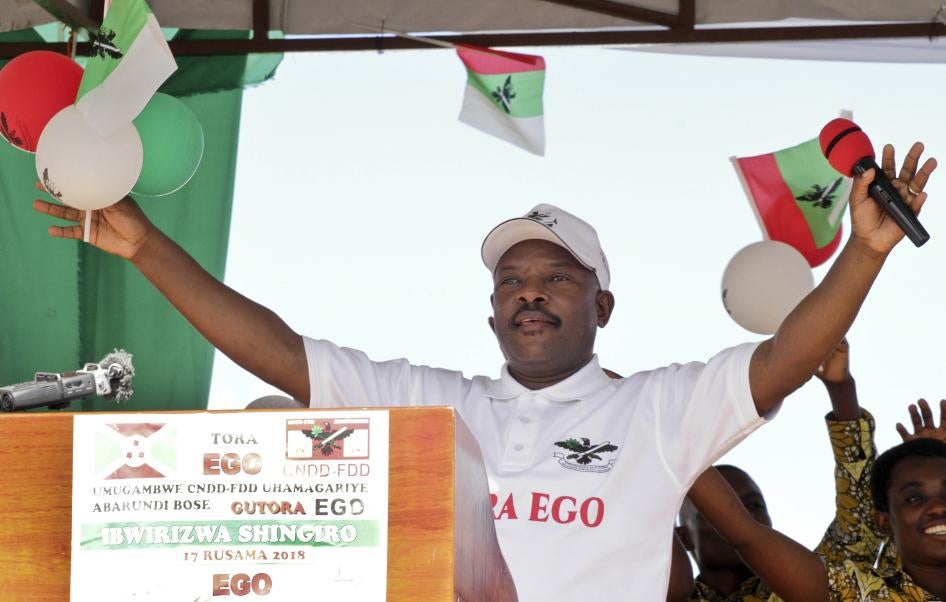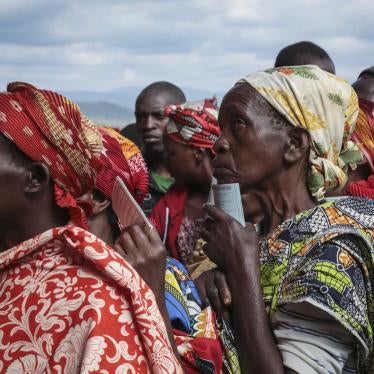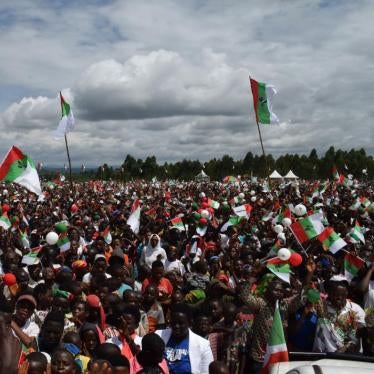(Nairobi) – Burundi’s authoritarian president, Pierre Nkurunziza, whose death was confirmed in a government statement on June 9, 2020, leaves a legacy of political repression and widespread human rights abuse. Days after the constitutional court declared the victory of his party’s candidate, Evariste Ndayishimiye, in the country’s May 2020 presidential elections, his death provides a moment for Burundi’s leadership to ensure concrete human rights and democratic reforms, and accountability for past abuses.
During Nkurunziza’s 15-year rule in Burundi, security services, other government agents, and members of the ruling National Council for the Defense of Democracy-Forces for the Defense of Democracy’s (Conseil national pour la défense de la démocratie-Forces de défense de la démocratie, CNDD-FDD) youth league, the Imbonerakure, executed, tortured, disappeared, raped, beat, extorted, and intimidated the population, often targeting those perceived to be against the government. The May 20 presidential, legislative, and communal elections took place in a highly repressive environment, marred by allegations of irregularities and abuse and with no independent international observers.
“Pierre Nkurunziza’s legacy will be of ruthless repression,” said Lewis Mudge, Central Africa director at Human Rights Watch. “His government decimated independent media and human rights organizations, blocked international scrutiny, and effectively closed Burundi to the outside world. Burundi’s leadership should demonstrate its commitment to human rights reform by taking urgent steps to put an end to the widespread abuse and make clear that the transition will result in a meaningful opening of political space.”
A former rebel leader during a brutal civil war that killed an estimated 300,000 Burundians, Nkurunziza was sworn in as president in 2005. During his rule, Burundi’s fragile progress toward democracy and stability suffered serious setbacks, as political upheaval and widespread killings by security forces and armed opposition groups gripped the country.
In April 2015, demonstrations broke out in response to the news that Nkurunziza would seek election for a third term. Police used excessive force and shot demonstrators indiscriminately, killing and injuring scores of people. After a failed coup d’état by a group of military officers in May, the government intensified its repression against suspected opponents and suspended most independent radio stations. While anti-Nkurunziza demonstrations were initially peaceful, some demonstrators resorted to violence. Government opponents also stepped up their violence in the aftermath of the July 2015 elections.
Since his reelection that year, Burundian state security forces, intelligence services, and members of the Imbonerakure carried out brutal, targeted attacks on opponents or suspected opponents. Human rights defenders were attacked, arrested, and prosecuted. The government placed severe restrictions on nongovernmental groups or shut them down entirely, and most leading activists and independent journalists fled the country for their security.
Whereas once the government tolerated criticism, albeit unhappily, during Nkurunziza’s last term in power, space for rights groups and independent journalists to operate freely vanished, Human Rights Watch said.
Nkurunziza’s third term was disputed, but the constitution clearly did not permit him to run again in 2020. A referendum was planned to change the constitution to increase presidential terms to seven years, renewable only once, and to reset the clock on terms already served. It took place in May 2018, against the backdrop of widespread abuses by local authorities, the police, and Imbonerakure members, with no almost no consequences. Imbonerakure members and local authorities continued to pressure people to join the party and target opposition members ahead of the 2020 elections, especially in rural areas.
However, Nkurunziza eventually announced he would not run for another term. Days before the CNDD-FDD nominated Évariste Ndayishimiye, the party’s then-secretary general, as its 2020 presidential candidate, Parliament adopted a law granting significant financial privileges to Nkurunziza, including a US$500,000 payment, a luxury villa, 6 cars, and a lifelong allowance after he stepped down. Nkurunziza was also set to become the country’s “Supreme Guide of Patriotism.”
According to the government’s statement, Nkurunziza died after suffering a cardiac arrest on June 8 at a hospital in Karuzi, in eastern Burundi. In late May, media reported that Nkurunziza’s wife and Burundi’s health minister were evacuated to Nairobi for medical treatment, although no official reason was given, feeding speculation about the potential spread of Covid-19 among government officials.
Nkurunziza’s government refused to follow World Health Organization (WHO) guidelines to prevent the spread of the virus, claiming Burundi was protected by God, and declared the WHO’s country director and three of its experts persona non grata on May 12. Although only 83 cases have been officially confirmed, medical workers and experts recently told Human Rights Watch they are concerned about an increase in suspected cases and the public health authorities’ failure to test those showing symptoms. They say some of their patients had attended the large gatherings and rallies organized during the campaign ahead of the May elections.
Five years into the crisis, the humanitarian and economic situation in Burundi is dire. According to the United Nations, 330,000 Burundian refugees remain outside of the country and an estimated 1.77 million Burundians needed humanitarian assistance in 2019. Most major donors suspended direct budgetary support to the government over their human rights concerns, and the government has increased pressure on international organizations in recent years.
The UN Human Rights Council established a Commission of Inquiry in September 2016 to document serious crimes in Burundi since April 2015, although the government has refused to cooperate. In September 2017, the commission concluded that it had “reasonable grounds to believe that crimes against humanity ha[d] been committed and continue[d] to be committed in Burundi since April 2015.”
On October 25, 2017, judges from the International Criminal Court (ICC) authorized an investigation into crimes committed in Burundi since April 2015. Two days later, Burundi became the first country to withdraw from the ICC. Yet ICC judges found that Burundi’s withdrawal does not affect the court’s jurisdiction over crimes committed while the country was a member. The ongoing investigation brings hope that those responsible for some of the worst crimes committed in Burundi in recent years may eventually be brought to justice.
“Pierre Nkurunziza’s death highlights the urgency for the many victims to know the truth about the crimes committed during his presidency and who was responsible,” Mudge said. “As long as these abuses go unpunished, this painful legacy will hang over Burundi for many years to come.”
|
News Release
Burundi: President Nkurunziza Dead Days After Vote
Ensure Accountability for Past Abuse
Your tax deductible gift can help stop human rights violations and save lives around the world.
Most Viewed
-
June 3, 2025
“They’re Ruining People’s Lives”

-
January 25, 2024
“We’re Dying Here”

-
November 25, 2019
A Dirty Investment

-
April 27, 2021
A Threshold Crossed

-
November 19, 2012
Losing Humanity





